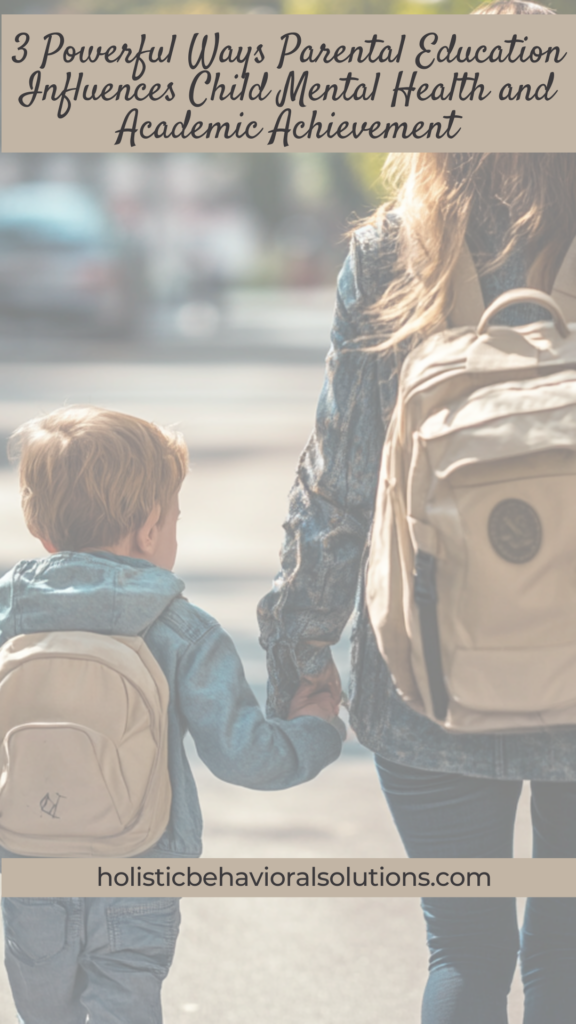
How Parental Education Shapes Child Mental Health and Academic Success
We all want the best for our children—to see them thrive, feel confident in school, and navigate life with resilience. But one factor that often goes unnoticed in shaping a child’s well-being is parental education. Not just in terms of academics, but in how it influences mental health, emotional stability, and overall development.
A large-scale study, the Norwegian Mother, Father, and Child Cohort Study (MoBa), followed nearly 35,000 children to explore the connection between parents’ educational levels and their children’s mental health and academic performance. The findings? Profound.
The results suggest that a parent’s level of education can influence a child’s risk of ADHD, depression, and academic struggles—even when accounting for genetics and environmental factors. This research brings up an important question: How does a parent’s education shape their child’s future, and what can we do to support families facing these challenges?
Parental Education and Mental Health: What the Research Reveals
The MoBa study offers valuable insight into how parental education levels influence children’s well-being in complex ways. Here’s what researchers discovered:
1️⃣ Higher Risk for Mental Health and Academic Struggles
Children whose parents had lower levels of education were nearly twice as likely to experience symptoms of:
🔹 ADHD – Attention and focus difficulties
🔹 Depression – Feelings of sadness, low energy, or withdrawal
🔹 Academic Challenges – Struggles with learning, motivation, and performance
💡 What this means for families:
These findings highlight the need for early support and intervention for children who may be at higher risk due to their family’s educational background. But it’s important to remember—education is just one factor, and families can overcome these challenges with the right tools and resources.
2️⃣ Parental Education Affects Child Development Beyond Genetics
Even after accounting for shared genetics and family environment, the link between parental education and child ADHD symptoms remained strong. This suggests that education itself—rather than just inherited traits—plays a direct role in shaping a child’s outcomes.
💡 What this means for parents:
A parent’s education can influence their parenting style, stress levels, and access to resources—all of which can affect a child’s ability to focus, regulate emotions, and succeed in school.
3️⃣ Depression and Genetics: A Deeper Connection
Unlike ADHD, researchers found that the connection between parental education and child depression was largely explained by genetics. This means that a parent’s genetic predisposition to depression may be passed down to their child, rather than education level alone being the driving factor.
💡 What this means for mental health professionals:
Early mental health screenings and interventions for children with a family history of depression can help break the cycle and provide preventative support before struggles become more severe.
Why Does Parental Education Matter?
So, what’s driving this connection between education and child well-being? Researchers point to several key factors:
1️⃣ Genetic Influences
Certain genetic traits are linked to both lower educational attainment and mental health conditions like ADHD and depression. If a parent has these traits, they may be passed down to their child, increasing the likelihood of similar struggles.
2️⃣ Social and Environmental Influences
Parents with lower education levels often face more socioeconomic challenges, including:
✔️ Limited access to quality schools and healthcare
✔️ Higher stress levels due to job instability or financial strain
✔️ Fewer opportunities for enrichment activities (like tutoring, extracurriculars, or therapy)
These factors can impact a child’s learning environment, emotional development, and sense of stability.
3️⃣ Parenting Styles and Family Stress
Educational background often shapes parenting styles and family dynamics. Parents with higher education levels may:
✔️ Feel more confident navigating school systems and advocating for their child
✔️ Have access to mental health and academic resources
✔️ Be more aware of developmental milestones and early intervention
Meanwhile, parents with lower educational backgrounds may face higher stress levels, affecting emotional availability, discipline styles, and overall family well-being.
Breaking the Cycle: How We Can Support Families
The good news? Education is not destiny. A parent’s level of education doesn’t define a child’s future—but support, intervention, and community resources can make a world of difference.
Here’s how we can empower families and create better outcomes for children:
1️⃣ Support Parents Through Education
Parental education isn’t just about degrees—it’s about knowledge, resources, and confidence in raising children.
💡 What helps?
✔️ Parenting workshops on child development, learning strategies, and mental health
✔️ Community programs that provide accessible education and skill-building
✔️ Encouraging lifelong learning, even outside of traditional schooling
2️⃣ Strengthen Community and School Resources
Children thrive when they have strong support systems—at home, in school, and in the community.
💡 How can we help?
✔️ Increase mental health access in schools (counseling, mindfulness programs, social-emotional learning)
✔️ Provide affordable tutoring and academic resources
✔️ Offer mentorship programs that connect students with positive role models
3️⃣ Prioritize Family Mental Health Support
Since both genetics and environment play a role in mental health, early intervention is key.
💡 Ways to support mental well-being:
✔️ Normalize mental health check-ins for both parents and kids
✔️ Offer accessible therapy and support groups for families under stress
✔️ Promote healthy coping strategies like mindfulness, exercise, and balanced nutrition
Parental Education and Mental Health:Building a Brighter Future for Families
The connection between parental education and child well-being is complex, but it’s not unchangeable. By supporting parents, strengthening communities, and prioritizing mental health, we can help children—no matter their background—build resilience, confidence, and academic success.
At The Holistic Store and in our practice, we believe that mental wellness starts at home. Our carefully curated supplements are designed to support focus, emotional balance, and stress resilience—helping both parents and children navigate life with greater ease.
💙 Explore our services and wellness collection and take the next step toward a thriving, resilient family.
👉 Shop Now for Family Wellness
Final Thoughts
Parenting is full of challenges, but education isn’t just about what we learned in school—it’s about what we continue to learn as we grow alongside our children.
Every conversation, every choice, and every moment of connection shapes our children’s future. And with the right support, every family has the power to thrive. 💙
PS: Are you a culturally competent licensed clinician passionate about guiding others toward resilience? Our practice is growing, and we’re hiring in New Jersey! Check out our Careers page for current openings and join a team dedicated to fostering impactful, inclusive mental health support.

